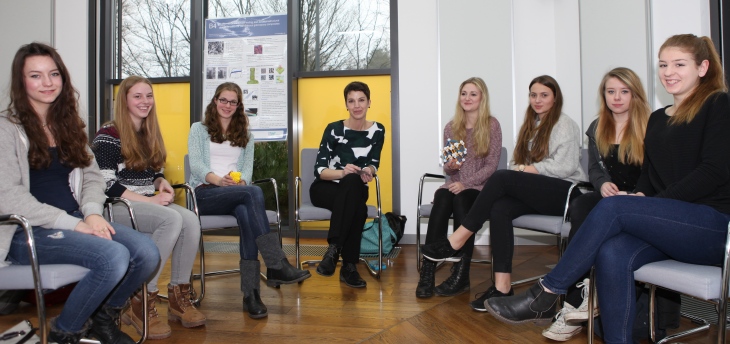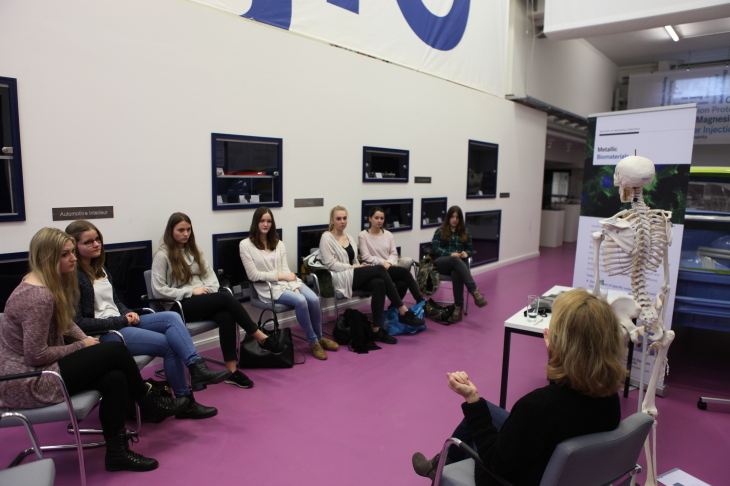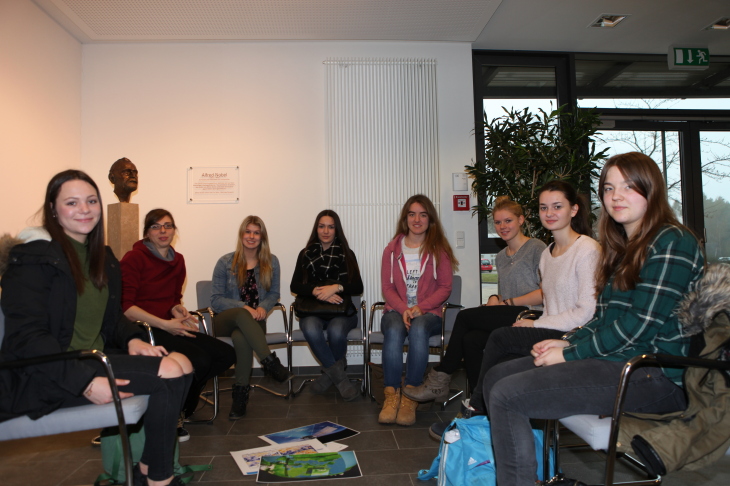First Scientific Speed Dating at the Helmholtz-Zentrum Geesthacht
On January 13th, 2016, approximately thirty female secondary school students from the Alfred Nobel School in Geesthacht meet with five female scientists from the Helmholtz-Zentrum Geesthacht (HZG). The researchers introduce themselves and their research fields in quick discussion sessions. They provide a glimpse into science through direct exchange and answered the eleventh grade students' questions on the profession and about university studies.

Prof. Dr. Erica Lilleodden (m.) spoke to the young women abput her research.
Photo: HZG/Heidrun Hillen
The pupils spoke with a scientist face to face in three successive rounds of discussions. This is the first year the Helmholtz-Zentrum will hold the “Date with Science” event. Dr. Iris Ulrich, the HZG Director of Program Planning and Controlling, explains: “We would especially like to win over young women by convincing them to undertake university studies in science and engineering so that in the long term women can fill more leadership positions in research.” Promoting young women is of particular interest at the HZG, as Dr. Ulrich points out: approximately 80% of scientists at the HZG come from the chemistry, physics, engineering and geoscience disciplines. Women are still underrepresented in these academic areas.

Prof. Dr. Regine Willumeit-Römer explains the main challenge on her topic: Biomaterials.
Photo: HZG/Heidrun Hillen
Promoting female secondary students has therefore been part of an equal opportunity strategy for quite a long time. The HZG has already been participating in this effort with a broad range of offerings since the introduction of “Girls Day” in 2001 (now known as “Day of the Future”). More than nine hundred girls have visited the German research centre within the “Day of the Future" program.
The HZG’s own school laboratory “Quantum Leap” has been cooperating with the Hamburg mint:pink program since 2014. The advancement program for girls encourages middle-grade female students to take on science and mathematic studies in the upper grade levels. Girls from ten Hamburg schools visit selected MINT locations where they can experience science and technology first-hand. Approximately ninety girls thus visit the HZG school laboratory.
Dr. Sabine Mendach, the speed dating initiator and director of the HZG school laboratory explains: “Apart from certain factors like career opportunities, a profession's image also plays a role in choice of university studies. This is where speed dating comes in, to show that MINT subjects can be exciting career paths for both women and men. Our female scientists discuss their own experience and, in doing so, offer an authentic role model.”

Dr. Katahrina Klehmet (2.f.l.) works at the Institute of coastal research.
Photo: HZG/Heidrun Hillen
About the scientists involved:
Institute Director Prof. Regine Willumeit-Römer earned her second doctorate in biogeochemistry and her research includes bio-compatibly dissolving implant material. Dr. Erica Lilleodden uses high performance microscopes to study metallic alloys for application in areas such as the construction of lightweight vehicles. Doctoral candidate Viktoria Fitseva researches protective titanium coatings for aircraft or medical products. Dr. Beate Geyer is a meteorologist and studies atmospheric conditions to draw conclusions on climate change in northern Germany. Dr. Katharina Klehmet works as a post-doctoral researcher at the HZG and researches the influence of climate change on storm floods in the Baltic Sea.
